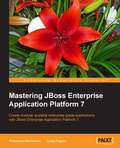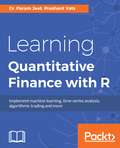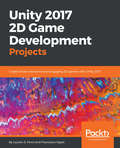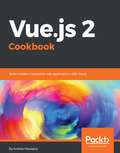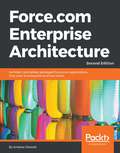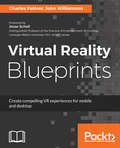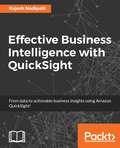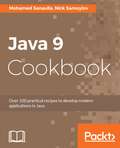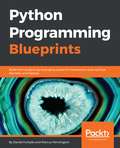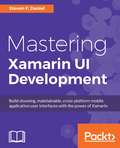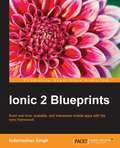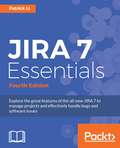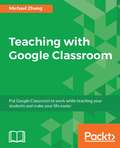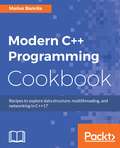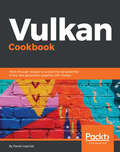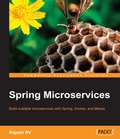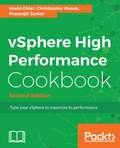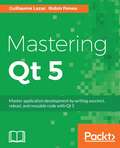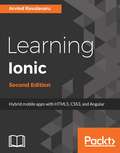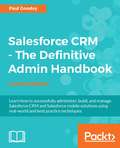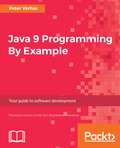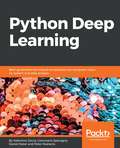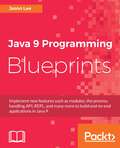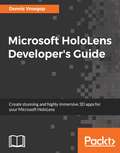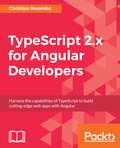- Table View
- List View
Mastering JBoss Enterprise Application Platform 7
by Francesco Marchioni Luigi FugaroCreate modular scalable enterprise-grade applications with JBoss Enterprise Application Platform 7 About This Book * Leverage the power of JBoss EAP 7 along with Java EE 7 to create professional enterprise grade applications. * Get you applications cloud ready and make them highly scalable using this advanced guide. * Become a pro Java Developer and move ahead of the crowd with this advanced practical guide. Who This Book Is For The ideal target audience for this book is Java System Administrators who already have some experience with JBoss EAP and who now want explore in depth creating Enterprise grade apps with the latest JBoss EAP version. What You Will Learn * Configure services using the Command Line Interface * Deliver fault tolerant server configurations * Harden the application server with advanced techniques * Expand the application server's horizon with tools such as like Docker/OpenShift * Create enterprise ready configurations using clustering techniques. * Deliver advanced security solutions and learn how to troubleshoot common network/performance issues In Detail The JBoss Enterprise Application Platform (EAP) has been one of the most popular tools for Java developers to create modular, cloud-ready, and modern applications. It has achieved a reputation for architectural excellence and technical savvy, making it a solid and efficient environment for delivering your applications. The book will first introduce application server configuration and the management instruments that can be used to control the application server. Next, the focus will shift to enterprise solutions such as clustering, load balancing, and data caching; this will be the core of the book. We will also discuss services provided by the application server, such as database connectivity and logging. We focus on real-world example configurations and how to avoid common mistakes. Finally, we will implement the knowledge gained so far in terms of Docker containers and cloud availability using RedHat's OpenShift. Style and approach If you are a Java developer who wants to level-up to modern day Java web development with the latest Java EE 7 and JBoss EAP 7, this book is the ideal solution for you. It addresses (in a clear and simple way) proof-of-concept scenarios such as clustering and cloud and container configurations, and explains how to solve common issues.
Learning Quantitative Finance with R
by Dr Param Jeet Prashant VatsImplement machine learning, time-series analysis, algorithmic trading and more About This Book • Understand the basics of R and how they can be applied in various Quantitative Finance scenarios • Learn various algorithmic trading techniques and ways to optimize them using the tools available in R. • Contain different methods to manage risk and explore trading using Machine Learning. Who This Book Is For If you want to learn how to use R to build quantitative finance models with ease, this book is for you. Analysts who want to learn R to solve their quantitative finance problems will also find this book useful. Some understanding of the basic financial concepts will be useful, though prior knowledge of R is not required. What You Will Learn • Get to know the basics of R and how to use it in the field of Quantitative Finance • Understand data processing and model building using R • Explore different types of analytical techniques such as statistical analysis, time-series analysis, predictive modeling, and econometric analysis • Build and analyze quantitative finance models using real-world examples • How real-life examples should be used to develop strategies • Performance metrics to look into before deciding upon any model • Deep dive into the vast world of machine-learning based trading • Get to grips with algorithmic trading and different ways of optimizing it • Learn about controlling risk parameters of financial instruments In Detail The role of a quantitative analyst is very challenging, yet lucrative, so there is a lot of competition for the role in top-tier organizations and investment banks. This book is your go-to resource if you want to equip yourself with the skills required to tackle any real-world problem in quantitative finance using the popular R programming language. You'll start by getting an understanding of the basics of R and its relevance in the field of quantitative finance. Once you've built this foundation, we'll dive into the practicalities of building financial models in R. This will help you have a fair understanding of the topics as well as their implementation, as the authors have presented some use cases along with examples that are easy to understand and correlate. We'll also look at risk management and optimization techniques for algorithmic trading. Finally, the book will explain some advanced concepts, such as trading using machine learning, optimizations, exotic options, and hedging. By the end of this book, you will have a firm grasp of the techniques required to implement basic quantitative finance models in R. Style and approach This book introduces you to the essentials of quantitative finance with the help of easy-to-understand, practical examples and use cases in R. Each chapter presents a specific financial concept in detail, backed with relevant theory and the implementation of a real-life example.
Unity 2017 2D Game Development Projects: Create three interactive and engaging 2D games with Unity 2017
by Andreas Oehlke Lauren S. FerroBuild classic arcade, shooter and platform games with Unity 2D toolset Key Features Leverage the amazing new functionalities of the latest Unity 2017 2D toolkit. Learn to create 2D characters, animations, fast and efficient game play experiences while keeping your games very lightweight Create engaging games that enable you to perform intergalactic warfare and also fun games similar to temple run and so on. Book Description 2D games are everywhere! Timeless and popular, 2D games represent a substantial segment of the games market. The Unity engine has revolutionized the gaming industry, by making it easier for game developers to create quality games on a budget. If you are looking for a guide to create 2D games using Unity 2017, look no further. With this book, you will learn all the essentials of 2D game development by creating three epic games in a step-by-step manner throughout the course of this book. The first game will have you collecting as many cakes as possible. The second will transport you to outer space to traverse as far as possible while avoiding enemy spaceships. The last game will have you running and jumping across platforms to collect coins and other exotic items. Throughout all these three games, you will create characters, make them move, and create some enemies. And then, of course, write code to destroy them!. After showing you the necessities of creating a game, this book will then help you to porting the game to a mobile platform, and provide a path to publish it on the stores. By the end of this book, you will not only have created three complete great games, but be able to apply your knowledge to create and deploy your own games. What you will learn Work with Unity 2017's new 2D workflow and create a 2D scene Set the scene with different types of backgrounds, either static or dynamically using a tileset Bring your character to life through simple animations Understand the core concepts of programming by creating basic code that controls a character and destroys an enemy Create buttons and game controls by using code snippets for input detection Develop three 2D games from genres such as classic arcade, space shooter, and platformer games Add audio and feedback and deploy your gamesWho this book is for If you are interested in creating your very own 2D games from scratch, then this book will give you all the tools you need to succeed. No C# knowledge is required, all you need is basic coding and scripting knowledge. Whether you are completely new to Unity or have used Unity before and would like to learn about the new 2D features of Unity, this book is for you.
Vue.js 2 Cookbook
by Andrea PassagliaThis book is for developers who want to learn about Vue.js through practical examples to quickly and efficiently build modern, interactive web applications. Prior experience and familiarity with JavaScript, HTML, and CSS are recommended as the recipes build upon that knowledge. It will also enable both new and existing Vue.js users to expand their knowledge of the framework.
Force.com Enterprise Architecture - Second Edition
by Andrew FawcettThis book is for advanced Force.com developers and architects who need to understand the Salesforce platform from the perspective of enterprise-level requirements. A prior understanding of Apex and Visualforce is a must. Those familiar with other enterprise software ecosystems will also find this book ideal as they adopt Force.com.
Virtual Reality Blueprints: Create compelling VR experiences for mobile and desktop
by John Williamson Charles PalmerJoin the virtual reality revolution by creating immersive 3D games and applications with Cardboard VR, Gear VR, OculusVR, and HTC Vive Key Features Develop robust, immersive VR experiences that are easy on the eye. Code 3D games and applications using Unity 3D game engine. Learn the basic principles of virtual reality applications Book Description Are you new to virtual reality? Do you want to create exciting interactive VR applications? There's no need to be daunted by the thought of creating interactive VR applications, it's much easier than you think with this hands-on, project-based guide that will take you through VR development essentials for desktop and mobile-based games and applications. Explore the three top platforms—Cardboard VR, Gear VR, and OculusVR —to design immersive experiences from scratch. You’ll start by understanding the science-fiction roots of virtual reality and then build your first VR experience using Cardboard VR. You'll then delve into user interactions in virtual space for the Google Cardboard then move on to creating a virtual gallery with Gear VR. Then you will learn all about virtual movements, state machines, and spawning while you shoot zombies in the Oculus Rift headset. Next, you'll construct a Carnival Midway, complete with two common games to entertain players. Along the way, you will explore the best practices for VR development, review game design tips, discuss methods for combating motion sickness and identify alternate uses for VR applications What you will learn Use Unity assets to create object simulation. Implement simple touch controls in your application. Apply artificial intelligence to achieve player and character interaction. Add scripts for movement, tracking, grasping, and spawning. Create animated walkthroughs, use 360-degree media, and build engaging VR experiences. Deploy your games on multiple VR platforms. Who this book is for If you are a game developer and a VR enthusiast now looking to get stuck into the VR app development process by creating VR apps for different platforms, then this is the book for you. Familiarity with the Unity game engine and the C# language is key to getting the most from this book.
Effective Business Intelligence with QuickSight
by Rajesh NadipalliFrom data to actionable insights using Amazon Quicksight!
Java 9 Cookbook
by Mohamed Sanaulla Nick SamoylovA definitive guide to learning the key concepts of modern application development in Java About This Book • Learn the latest features of Java 9 • Extend your Java knowledge and take your application to new levels by making it fast, secure, and scalable • Delve into the intricacies of Modular programming in Java 9 Who This Book Is For The book is for intermediate to advanced Java programmers who want to make their applications fast, secure, and scalable. What You Will Learn • Set up JDK and know the differences in the JDK 9 installation • Implement OO designs using classes and interfaces • Manage operating system processes • Understand the new modular JDK and modular programming • Create a modular application with clear dependencies • Build graphical user interfaces using JavaFX • Use the new HTTP Client API • Learn about the new diagnostic features in Java 9 • See how to use the new jShell REPL tool • Execute ES6-compliant JavaScript code from your Java applications In Detail Java is an object-oriented programming language. It is one of the most widely accepted languages because of its design and programming features, particularly in its promise that you can write a program once and run it anywhere. This cookbook offers a range of software development examples in simple and straightforward Java 9 code, providing step-by-step resources and time-saving methods to help you solve data problems efficiently. Starting with the installation of Java, each recipe addresses a specific problem, with a discussion that explains the solution and offers insight into how it works. We cover major concepts such as Project Jigsaw and various tools that will enable you to modularize your applications. You will learn new features in the form of recipes that will make your applications modular, secure, and fast. Style and approach Each recipe in this book contains a series of complete instructions to perform a core task, plus an explanation of the purpose behind it. Similar methods or further refinements are included with each recipe to provide comprehensive guidance.
Python Programming Blueprints: Build nine projects by leveraging powerful frameworks such as Flask, Nameko, and Django
by Pierluigi Riti Marcus Pennington Daniel FurtadoHow to build useful, real-world applications in the Python programming language Key Features Deliver scalable and high-performing applications in Python. Delve into the great ecosystem of Python frameworks and libraries through projects that you will build with this book. This comprehensive guide will help you demonstrate the power of Python by building practical projects. Book Description Python is a very powerful, high-level, object-oriented programming language. It's known for its simplicity and huge community support. Python Programming Blueprints will help you build useful, real-world applications using Python. In this book, we will cover some of the most common tasks that Python developers face on a daily basis, including performance optimization and making web applications more secure. We will familiarize ourselves with the associated software stack and master asynchronous features in Python. We will build a weather application using command-line parsing. We will then move on to create a Spotify remote control where we'll use OAuth and the Spotify Web API. The next project will cover reactive extensions by teaching you how to cast votes on Twitter the Python way. We will also focus on web development by using the famous Django framework to create an online game store. We will then create a web-based messenger using the new Nameko microservice framework. We will cover topics like authenticating users and, storing messages in Redis. By the end of the book, you will have gained hands-on experience in coding with Python. What you will learn Learn object-oriented and functional programming concepts while developing projects The dos and don'ts of storing passwords in a database Develop a fully functional website using the popular Django framework Use the Beautiful Soup library to perform web scrapping Get started with cloud computing by building microservice and serverless applications in AWS Develop scalable and cohesive microservices using the Nameko framework Create service dependencies for Redis and PostgreSQLWho this book is for This book is for software developers who are familiar with Python and want to gain hands-on experience with web and software development projects. A basic knowledge of Python programming is required.
Mastering Xamarin UI Development
by Steven F. DanielBuild stunning, maintainable, cross-platform mobile application user interfaces with the power of Xamarin About This Book • Create, configure, and customize stunning platform-specific features as well as cross-platform UIs with the power of Xamarin Forms. • Maximize the testability, flexibility, and overall quality of your Xamarin apps. • Get the most out of Xamarin.Forms and create your own reusable templates with C# scripting in Xamarin. Who This Book Is For If you are a mobile developer with basic knowledge of Xamarin and C# coding, then this book is for you. What You Will Learn • Develop stunning native cross-platform apps using the Xamarin.Forms framework • Work with the different UI layouts to create customized layouts using the C# programming language and tweak it for a given platform • Customize the user interface using DataTemplates and CustomRenderers and the Platform Effects API to change the appearance of control elements • Build hybrid apps using the Razor Template Engine and create Razor Models that communicate with a SQLite database • Use location based features within your app to display the user's current location • Work with the Xamarin.Forms Map control to display Pin placeholders based on the stored latitude and longitude coordinates • Understand and use the MVVM pattern architecture to navigate between each of your ViewModels and implement Data Binding to display and update information • Work with the Microsoft Azure Platform to incorporate API Data Access using Microsoft Azure App Services and the RESTful API • Incorporate third-party features within your app using the Facebook SDK and the Open Graph API • Perform unit testing and profile your Xamarin.Forms applications • Deploy your apps to the Google Play Store and Apple App Store In Detail Xamarin is the most powerful cross-platform mobile development framework. If you are interested in creating stunning user interfaces for the iOS and Android mobile platforms using the power of Xamarin and Xamarin.Forms, then this is your ticket. This book will provide you the practical skills required to develop real-world Xamarin applications. You will learn how to implement UI structures and layouts, create customized elements, and write C# scripts to customize layouts. You will create UI layouts from scratch so that you can tweak and customize a given UI layout to suit your needs by using Data Templates. Moving on, you will use third-party libraries – such as the Razor template engine that allows you to create your own HTML5 templates within the Xamarin environment – to build a book library Hybrid solution that uses the SQLite.Net library to store, update, retrieve, and delete information within a SQLite local database. You'll also implement key data-binding techniques that will make your user interfaces dynamic, and create personalized animations and visual effects within your user interfaces using Custom Renderers and the PlatformEffects API to customize and change the appearance of control elements. At the end of this book, you will test your application UI for robust and consistent behavior and then explore techniques to deploy to different platforms. Style and approach This easy to follow guide will walk you through building a real world Xamarin.Forms mobile app from start to finish. Each chapter builds upon the app using a step-by-step methodology that applies new advanced functionalities, design patterns, and best practices.
Ionic 2 Blueprints
by Indermohan SinghBuild real-time, scalable, and interactive mobile apps with the Ionic framework About This Book * Create amazing, cross-platform hybrid native apps using a projects-based approach * Discover ways to make the best use of the latest features in Ionic to build on a wide array of applications * This is the right learning curve for you if you want to take the leap from an intermediate-level to a pro front-end developer with Ionic Who This Book Is For This book is for intermediate-level Ionic developers who have some experience in working with Ionic, but don't yet have a complete idea how powerful Ionic can be to create real-time apps with dynamic functionality. What You Will Learn * Get to grips with the features of Ionic for application development * Build a Chat app with Firebase and Ionic * Make a stock tracking app using the third-party REST API and build its layouts with Ionic Navigation and Pages * Use Cordova plugins with Ionic to build a media player app * Create a production-ready application by using Ionic components, services, and Firebase as a back end * Get to know the best practices to create real-time Ionic applications In Detail Ionic 2, the latest version of Ionic Mobile SDK, is built on the top of latest technologies such as Angular 2, TypeScript, SASS, and lot more. The idea behind Ionic 2 is to make the entire app development process even more fun. This book makes it possible to build fun and engaging apps using Ionic 2. You will learn how to use various Ionic components, integrate external services, derive capabilities, and most importantly how to make professional apps with Ionic 2. It will help you in understanding the fundamentals of Ionic 2 app development and will show how to build applications, gradually increasing your capabilities and the complexity of applications so that you can learn Ionic app development in a consistent and convenient way. You will also explore services such as Firebase, using LocalStorage, the WordPress JSON API, and REST API, which will help you turn your next billion dollar idea into reality. By the end of this book, you will be able to proudly call yourself a pro Ionic developer who can create a host of different apps with Ionic, and you'll have a deeper practical understanding of Ionic. Style and approach A practical project-based approach helps you create five-six different apps on your own using the various features of Ionic in each project.
JIRA 7 Essentials - Fourth Edition
by Patrick LiExplore the great features of the all-new JIRA 7 to manage projects and effectively handle bugs and software issues About This Book * Updated for JIRA 7, this book covers all the new features introduced in JIRA 7 with a dedicated chapter on JIRA Service Desk--one of the biggest new add-ons to JIRA * This book lays a strong foundation to work with agile projects in JIRA from both the administrator and end user's perspective * Work through step-by-step exercises at the end of each chapter for you to try out and reinforce your skills Who This Book Is For This book will be especially useful for project managers but it's also intended for other JIRA users, including developers, and any other industry besides software development, who would like to leverage JIRA's powerful task management and workflow features to better manage their business processes. What You Will Learn * Understand JIRA's data hierarchy and how to design and work with projects in JIRA * Plan and set up a new JIRA 7 instance from scratch for production use * Using JIRA for agile software projects, business process management, customer service support, and more * Understand issues and work with them * Design both system and custom fields to behave differently under different contexts * Create and design your own screens and apply them to different project and issue types * Gain an understanding of the workflow and its various components * Set up both incoming and outgoing mail servers to work with e-mails In Detail Atlassian JIRA is an enterprise-issue tracker system. One of its key strengths is its ability to adapt to the needs of the organization, ranging from building Atlassian application interfaces to providing a platform for add-ons to extend JIRA's capabilities. JIRA 7 Essentials, now in its fourth edition, provides a comprehensive explanation covering all major components of JIRA 7, which includes JIRA Software, JIRA Core, and JIRA Service Works. The book starts by explaining how to plan and set up a new JIRA 7 instance from scratch for production use before moving on to the more key features such as e-mails, workflows, business processes, and so on. Then you will understand JIRA's data hierarchy and how to design and work with projects in JIRA. Issues being the corner stone of using JIRA, you will gain a deep understanding of issues and their purpose. Then you will be introduced to fields and how to use custom fields for more effective data collections. You will then learn to create new screens from scratch and customize it to suit your needs. The book then covers workflows and business processes, and you will also be able to set up both incoming and outgoing mail servers to work with e-mails. Towards the end, we explain JIRA's security model and introduce you to one of JIRA's new add-ons: JIRA Service Desk, which allows you to run JIRA as a computer support portal. Style and approach This is a comprehensive, practical guide on using JIRA to efficiently manage all your projects. It provides clear, step-by-step explanations, and shows how you can use the various features of JIRA to manage your projects more efficiently.
Teaching with Google Classroom
by Michael ZhangPut Google Classroom to work while teaching your students and make your life easier About This Book * This is the first book to guide educators step by step through teaching with Google Classroom * It's focused on you, your students, and providing great learning experiences easily * It's easy to follow, with everything you need to get started and keep going even if you're not a technology fan Who This Book Is For This is a book for educators who want to use Google Classroom to teach better. It's not for geeks. There are rich examples, clear instructions, and enlightening explanations to help you put this platform to work. What You Will Learn * Create a Google Classroom and add customized information for each individual class * Add students to a Google Classroom * Send announcements and questions to students * Create, distribute, collect, and grade assignments through Google Classroom * Add events to and share a Google Classroom's calendar with parents to track a student's progress * Reuse posts, archive classrooms, and perform other administrative tasks in Google Classroom * Use Google Docs Add-ons, and Google Chrome Webstore Apps and Extensions to enhance assignments * Set up Google Classroom's mobile app In Detail Google Classroom helps teachers bring their work online. According to Google Trends, it's already bigger than Moodle after barely a year in the wild. This book is a complete start-to-finish guide for teachers using Google Classroom for the first time. It explains what Google Classroom is, what it can do, how to set it up, and how to use it to enhance student learning while making your life as a teacher easier. It shows you how to place resources and activities online, gather assignments, and develop group and individual activities. It's not just a manual, you'll also discover inspiring, easy ways to put Google Classroom to work for you and your class. Style and approach This is a step-by-step guide to using Google Classroom, the rapidly emerging platform for education, effectively.
Modern C++ Programming Cookbook
by Marius BancilaOver 100 recipes to help you overcome your difficulties with C++ programming and gain a deeper understanding of the working of modern C++ About This Book • Explore the most important language and library features of C++17, including containers, algorithms, regular expressions, threads, and more, • Get going with unit testing frameworks Boost.Test, Google Test and Catch, • Extend your C++ knowledge and take your development skills to new heights by making your applications fast, robust, and scalable. Who This Book Is For If you want to overcome difficult phases of development with C++ and leverage its features using modern programming practices, then this book is for you. The book is designed for both experienced C++ programmers as well as people with strong knowledge of OOP concepts. What You Will Learn • Get to know about the new core language features and the problems they were intended to solve • Understand the standard support for threading and concurrency and know how to put them on work for daily basic tasks • Leverage C++'s features to get increased robustness and performance • Explore the widely-used testing frameworks for C++ and implement various useful patterns and idioms • Work with various types of strings and look at the various aspects of compilation • Explore functions and callable objects with a focus on modern features • Leverage the standard library and work with containers, algorithms, and iterators • Use regular expressions for find and replace string operations • Take advantage of the new filesystem library to work with files and directories • Use the new utility additions to the standard library to solve common problems developers encounter including string_view, any , optional and variant types In Detail C++ is one of the most widely used programming languages. Fast, efficient, and flexible, it is used to solve many problems. The latest versions of C++ have seen programmers change the way they code, giving up on the old-fashioned C-style programming and adopting modern C++ instead. Beginning with the modern language features, each recipe addresses a specific problem, with a discussion that explains the solution and offers insight into how it works. You will learn major concepts about the core programming language as well as common tasks faced while building a wide variety of software. You will learn about concepts such as concurrency, performance, meta-programming, lambda expressions, regular expressions, testing, and many more in the form of recipes. These recipes will ensure you can make your applications robust and fast. By the end of the book, you will understand the newer aspects of C++11/14/17 and will be able to overcome tasks that are time-consuming or would break your stride while developing. Style and approach This book follows a recipe-based approach, with examples that will empower you to implement the core programming language features and explore the newer aspects of C++.
Vulkan Cookbook
by Pawel LapinskiWork through recipes to unlock the full potential of the next generation graphics API—Vulkan About This Book • This book explores a wide range of modern graphics programming techniques and GPU compute methods to make the best use of the Vulkan API • Learn techniques that can be applied to a wide range of platforms desktop, smartphones, and embedded devices • Get an idea on the graphics engine with multi-platform support and learn exciting imaging processing and post-processing techniques Who This Book Is For This book is ideal for developers who know C/C++ languages, have some basic familiarity with graphics programming, and now want to take advantage of the new Vulkan API in the process of building next generation computer graphics. Some basic familiarity of Vulkan would be useful to follow the recipes. OpenGL developers who want to take advantage of the Vulkan API will also find this book useful. What You Will Learn • Work with Swapchain to present images on screen • Create, submit, and synchronize operations processed by the hardware • Create buffers and images, manage their memory, and upload data to them from CPU • Explore descriptor sets and set up an interface between application and shaders • Organize drawing operations into a set of render passes and subpasses • Prepare graphics pipelines to draw 3D scenes and compute pipelines to perform mathematical calculations •Implement geometry projection and tessellation, texturing, lighting, and post-processing techniques •Write shaders in GLSL and convert them into SPIR-V assemblies •Find out about and implement a collection of popular, advanced rendering techniques found in games and benchmarks In Detail Vulkan is the next generation graphics API released by the Khronos group. It is expected to be the successor to OpenGL and OpenGL ES, which it shares some similarities with such as its cross-platform capabilities, programmed pipeline stages, or nomenclature. Vulkan is a low-level API that gives developers much more control over the hardware, but also adds new responsibilities such as explicit memory and resources management. With it, though, Vulkan is expected to be much faster. This book is your guide to understanding Vulkan through a series of recipes. We start off by teaching you how to create instances in Vulkan and choose the device on which operations will be performed. You will then explore more complex topics such as command buffers, resources and memory management, pipelines, GLSL shaders, render passes, and more. Gradually, the book moves on to teach you advanced rendering techniques, how to draw 3D scenes, and how to improve the performance of your applications. By the end of the book, you will be familiar with the latest advanced techniques implemented with the Vulkan API, which can be used on a wide range of platforms. Style and approach This recipe-based guide will empower you to implement modern graphic programming techniques and help gain a solid understanding of the new Vulkan API.
Spring Microservices
by Rajesh RvIf you are a Spring developers and want to build cloud-ready, internet-scale applications to meet modern business demands, then this book is for you Developers will understand how to build simple Restful services and organically grow them to truly enterprise grade microservices ecosystems.
vSphere High Performance Cookbook - Second Edition
by Kevin ElderOver 80 recipes to help you improve vSphere 6.5's performance and solve problems before they ariseAbout This Book* The practical recipes provide cost-effective and high performance for any application running in a virtual machine* Contains best practices and troubleshooting techniques to resolve vSphere 6.5 performance issues * Get a comprehensive coverage of performance issues and solutions including vCenter Server design and virtual machine and application tuningWho This Book Is ForIf you are a system administrator and are planning to deploy vSphere 6.5 in your organization and want to maximize its performance, then this book is for you. Prior knowledge of the vSphere 6.5 concepts is essential.What You Will Learn* Understand the VMM Scheduler, cache aware CPU Scheduler, NUMA aware CPU Scheduler, and more during the CPU Performance Design phase* Get to know the virtual memory reclamation technique, host ballooning monitoring, and swapping activity* Choose the right platform while designing your vCenter Server, redundant vCenter design, and vCenter SSO and its deployment* Learn how to use various performance simulation tools* Design VCSA Server Certificates to minimize security threats* Use health check tools for storage and boost vSphere 6.5's performance with VAAI and VASAIn DetailvSphere is a mission-critical piece of software for many businesses. It is a complex tool, and incorrect design and deployment can create performance related issues that can negatively affect the business. This book is focused on solving these problems as well as providing best practices and performance-enhancing techniques. This edition is fully updated to include all the new features in version 6.5 as well as the latest tools and techniques to keep vSphere performing at its best.This book starts with interesting recipes, such as the interaction of vSphere 6.5 components with physical layers such as CPU, memory, and networking. Then we focus on DRS, resource control design, and vSphere cluster design. Next, you'll learn about storage performance design and how it works with VMware vSphere 6.5. Moving on, you will learn about the two types of vCenter installation and the benefits of each. Lastly, the book covers performance tools that help you get the most out of your vSphere installation.By the end of this book, you will be able to identify, diagnose, and troubleshoot operational faults and critical performance issues in vSphere 6.5.Style and approachThis cookbook is written in a practical, helpful style with numerous recipes focusing on answering and providing solutions to common and not-so-common performance issues and problems.
Mastering Qt 5
by Guillaume Lazar Robin PeneaMaster application development by writing succinct, robust, and reusable code with Qt 5 About This Book • Unleash the power of Qt 5 with C++14 • Integrate useful third-party libraries such as OpenCV • Package and deploy your application on multiple platforms Who This Book Is For This book will appeal to developers and programmers who would like to build GUI-based applications. Knowledge of C++ is necessary and the basics of Qt would be helpful. What You Will Learn • Create stunning UIs with Qt Widget and Qt Quick • Develop powerful, cross-platform applications with the Qt framework • Design GUIs with the Qt Designer and build a library in it for UI preview • Handle user interaction with the Qt signal/slot mechanism in C++ • Prepare a cross-platform project to host a third-party library • Build a Qt application using the OpenCV API • Use the Qt Animation framework to display stunning effects • Deploy mobile apps with Qt and embedded platforms In Detail Qt 5.7 is an application development framework that provides a great user experience and develops full-capability applications with Qt Widgets, QML, and even Qt 3D. This book will address challenges in successfully developing cross-platform applications with the Qt framework. Cross-platform development needs a well-organized project. Using this book, you will have a better understanding of the Qt framework and the tools to resolve serious issues such as linking, debugging, and multithreading. Your journey will start with the new Qt 5 features. Then you will explore different platforms and learn to tame them. Every chapter along the way is a logical step that you must take to master Qt. The journey will end in an application that has been tested and is ready to be shipped. Style and approach This is an easy-to-follow yet comprehensive guide to building applications in Qt. Each chapter covers increasingly advanced topics, with subjects grouped according to their complexity as well as their usefulness. Packed with practical examples and explanations, Mastering Qt contains everything you need to take your applications to the next level.
Learning Ionic 2 - Second Edition
by Arvind RavulavaruThis book is for JavaScript developers with basic skills. No previous knowledge of Ionic is required for this book.
Salesforce CRM - The Definitive Admin Handbook - Fourth Edition
by Paul GoodeyLearn how to successfully administer, build, and manage Salesforce CRM and Salesforce mobile solutions using real-world and best practice techniques About This Book • See the latest best practice Salesforce administration principles, gain real-world advice, and understand critical design considerations to set up and customize Salesforce CRM • This is a pragmatic guide to the key functions of customizing and setting up the application for enterprise security, user and data management, process automation, analytics, and mobile features • Step-by-step navigation and descriptions of the features of Salesforce CRM platform and clear guidance on the customization and administration of the application • Identify what is covered to create your own improved study guide for the certified administrator examination Who This Book Is For This book is for administrators who want to develop and strengthen their Salesforce CRM skills in the areas of configuration and system management. Whether you are a new administrator or a more experienced professional, this book will enhance your knowledge and understanding of the features of Salesforce CRM. What You Will Learn • Manage and administer user records and password policies • Configure and control the various organization-wide user interface features in Salesforce CRM • Set up and maintain users, profiles, and permission sets and administer appropriate security and login access mechanisms • Apply organization security • Understand the capabilities of the Salesforce CRM sharing model • Create, delete, and customize fields, page layout, and list views for custom and standard objects • Find out how Apex and Visualforce coding can be used in Salesforce CRM • Implement the mechanisms for data management • Discover the tools to import, update, transfer, and mass delete data In Detail Salesforce CRM's Winter '17 release offers a host of new features for CRM designed to transform your sales and marketing requirements. With this comprehensive guide to implementing Salesforce CRM, administrators of all levels can easily acquire deep knowledge of the platform. The book begins by guiding you through setting up users and the security settings and then progresses to configuration, data management, and data analytics. We swiftly move on to the setting up of organization wide features that affect the look and feel of the application. Process automation and approval mechanisms are covered next, along with the functional areas of Sales Cloud, Service Cloud, Marketing Cloud, and Salesforce Chatter. This book details Salesforce CRM system administration in a practical way and is an invaluable reference for both new administrators and experienced professionals. At the end of the book, techniques to further enhance the system and improve the return on investment Salesforce mobile apps and mobile administration are covered, along with Salesforce Adoption Manager. Every chapter is complete with a section containing example questions of the type that you might encounter in the certification examination. Style and approach This book takes a straightforward, no-nonsense approach to working with the Salesforce CRM platform. Filled with examples and use cases, the book presents the facts along with seasoned advice and real-world examples to ensure you have all the resources you need to become a more informed Salesforce Administrator.
Java 9 Programming By Example
by Peter VerhasThis book is for anyone who wants to learn the Java programming language. You are expected to have some prior programming experience with another language, such as JavaScript or Python, but no knowledge of earlier versions of Java is assumed.
Python Deep Learning
by Daniel Slater Gianmario Spacagna Peter Roelants Valentino ZoccaTake your machine learning skills to the next level by mastering Deep Learning concepts and algorithms using Python. About This Book Explore and create intelligent systems using cutting-edge deep learning techniques Implement deep learning algorithms and work with revolutionary libraries in Python Get real-world examples and easy-to-follow tutorials on Theano, TensorFlow, H2O and more Who This Book Is For This book is for Data Science practitioners as well as aspirants who have a basic foundational understanding of Machine Learning concepts and some programming experience with Python. A mathematical background with a conceptual understanding of calculus and statistics is also desired. What You Will Learn Get a practical deep dive into deep learning algorithms Explore deep learning further with Theano, Caffe, Keras, and TensorFlow Learn about two of the most powerful techniques at the core of many practical deep learning implementations: Auto-Encoders and Restricted Boltzmann Machines Dive into Deep Belief Nets and Deep Neural Networks Discover more deep learning algorithms with Dropout and Convolutional Neural Networks Get to know device strategies so you can use deep learning algorithms and libraries in the real world In Detail With an increasing interest in AI around the world, deep learning has attracted a great deal of public attention. Every day, deep learning algorithms are used broadly across different industries. The book will give you all the practical information available on the subject, including the best practices, using real-world use cases. You will learn to recognize and extract information to increase predictive accuracy and optimize results. Starting with a quick recap of important machine learning concepts, the book will delve straight into deep learning principles using Sci-kit learn. Moving ahead, you will learn to use the latest open source libraries such as Theano, Keras, Google's TensorFlow, and H20. Use this guide to uncover the difficulties of pattern recognition, scaling data with greater accuracy and discussing deep learning algorithms and techniques. Whether you want to dive deeper into Deep Learning, or want to investigate how to get more out of this powerful technology, you'll find everything inside. Style and approach Python Machine Learning by example follows practical hands on approach. It walks you through the key elements of Python and its powerful machine learning libraries with the help of real world projects.
Java 9 Programming Blueprints
by Jason LeeBuild a variety of real-world applications by taking advantage of the newest features of Java 9 About This Book • See some of the new features of Java 9 and be introduced to parts of the Java SDK • This book provides a set of diverse, interesting projects that range in complexity from fairly simple to advanced and cover HTTP 2.0 • Take advantage of Java's new modularity features to write real-world applications that solve a variety of problems Who This Book Is For This book is for Java developers who are already familiar with the language. Familiarity with more advanced topics, such as network programming and threads, would be helpful, but is not assumed. What You Will Learn • Learn how to package Java applications as modules by using the Java Platform Module System • Implement process management in Java by using the all-new process handling API • Integrate your applications with third-party services in the cloud • Interact with mail servers using JavaMail to build an application that filters spam messages • Learn to use JavaFX to build rich GUI based applications, which are an essential element of application development • Write microservices in Java using platform libraries and third-party frameworks • Integrate a Java application with MongoDB to build a cloud-based note taking application In Detail Java is a powerful language that has applications in a wide variety of fields. From playing games on your computer to performing banking transactions, Java is at the heart of everything. The book starts by unveiling the new features of Java 9 and quickly walks you through the building blocks that form the basis of writing applications. There are 10 comprehensive projects in the book that will showcase the various features of Java 9. You will learn to build an email filter that separates spam messages from all your inboxes, a social media aggregator app that will help you efficiently track various feeds, and a microservice for a client/server note application, to name a few. The book covers various libraries and frameworks in these projects, and also introduces a few more frameworks that complement and extend the Java SDK. Through the course of building applications, this book will not only help you get to grips with the various features of Java 9, but will also teach you how to design and prototype professional-grade applications with performance and security considerations. Style and approach This is a learn-as-you-build practical guide to building full-fledged applications using Java 9. With a project-based approach, we'll improve your Java skills. You will experience a variety of solutions to problems with Java.
Microsoft HoloLens Developer's Guide
by Dennis VroegopTransform the ways you communicate, create, collaborate, and explore using Microsoft HoloLens About This Book • Create immersive augmented reality apps for Microsoft HoloLens from scratch • Leverage the powerful HoloLens sensors to interact with real-world motions and gestures and make your app life-like • Explore the powerful Unity 5 SDK along with the Windows Unified platform to get the most out of your HoloLens app Who This Book Is For If you are a developer who wants to create augmented reality apps for the Microsoft HoloLens platform, then this is the book for you. Coding experience with C# is assumed. What You Will Learn • Design an app for HoloLens that is feasible and attractive to use • Add gestures and interact with them • Create sounds in the app and place them in a 3D space • Use voice generation and voice recognition to make your apps more lifelike • Interact with the physical environment to place holograms on top of physical objects • Compare HoloLens with the other products and know how to use its strengths • Use assets from third parties to enrich our app In Detail HoloLens, Microsoft's innovative augmented reality headset, overlaps holograms into a user's vision of their environment. Your ideas are closer to becoming real when you can create and work with holograms in relation to the world around you. If you are dreaming beyond virtual worlds, beyond screens, beyond pixels, and want to take a big leap in the world of augmented reality, then this is the book you want. Starting off with brainstorming and the design process, you will take your first steps in creating your application for HoloLens. You will learn to add gestures and write an app that responds to verbal commands before gradually moving on creating sounds in the app and placing them in a 3D space. You will then communicate between devices in the boundaries of the UWP model. Style and approach This book takes a step-by-step, practical, tutorial-style approach where you will dive deep into HoloLens app development. You will work with the API and write your own complex scripts that would interact with the powerful HoloLens sensors and with realistic examples, you will be able to create immersive 3D apps for HoloLens.
TypeScript 2.x for Angular Developers
by Christian NwambaWrite better, reusable, and predictable Angular apps with typed logic About This Book • Leverage the power of TypeScript for developing large-scale Angular apps • Take advantage of the cutting-edge features of TypeScript 2.x to build high-performing, maintainable applications • Explore the TypeScript implementation of modules, classes, and annotations with Angular components Who This Book Is For This book is for developers who would like to learn to use TypeScript to develop Angular applications. A basic JavaScript knowledge would be beneficial. What You Will Learn • Move from loose types to predictable strict types • Write self-documented API methods and data structures • Understand custom generic types for complex data structures • Implement Contract with Interfaces • Enhance Dependency Injection in Angular via class constructors • Explore TypeScript advanced types • Build Interactive web apps with Angular and TypeScript In Detail TypeScript, a superset of JavaScript, is the default language for building Angular applications from Google. TypeScript 2.0 adds optional static types, classes, and modules to JavaScript, to enable great tooling and better structuring of large JavaScript applications. This book will teach you how to leverage the exciting features of TypeScript while working on Angular projects to build scalable, data-intensive web applications. You will begin by setting up and installing TypeScript and then compile it with JavaScript. You will then learn to write simple JavaScript expressions with TypeScript. You will then go through some built in TypeScript types and accessors. Further you will build web components using TypeScript Interfaces and Decorators. You will go through the Angular form module, which will enable you to write predictable typed forms with TypeScript and learn to use typed DOM events. You will also build a single-page application using the Router module. Lastly, you will consume API data with Angular's HTTP Module and handle responses with RxJS observables. At the end of the book, you will go through different testing and debugging techniques. Style and approach A step-by-step, tutorial-based guide
